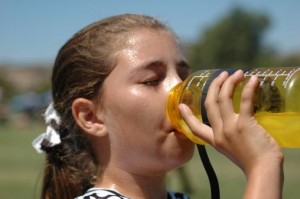Dangers of Extreme Heat and How You Can Protect Yourself
For most people, summer represents the chance to gather with family and friends for some outdoor fun. If you’re not careful, however, the heat and high humidity that comes along with summer weather can actually cause physical harm to yourself and your guests. Let’s take a look at what overheating can do to you as well as some helpful tips for keeping out of harm’s way.
What happens to the body in extreme heat?
Overheating can present itself a number of ways. It typically starts with excessive sweating and the feeling of fatigue. If not addressed at this point, you may also begin to experience nausea and dizziness, and your muscles may begin to cramp up. Further, prolonged exposure to high heat can result in fainting, seizures and, in rare cases, even death. Severe overheating is usually diagnosed as either heat exhaustion or heat stroke.
The real danger lies in ignoring or downplaying the symptoms, as this allows the condition to progress further. Some of the tell-tale signs that someone may be experiencing a serious heat-related illness include:
- High fever
- Confusion
- Disorientation
- Elevated heart rate/stronger pulse
- Absence of sweating
- Drunken behavior
Medical attention should be sought immediately if any of these symptoms are present.
How to stay cool in the hot temps….
Now that you know the signs to look for, let’s take a look at some ways that you can combat heat-related illness right away and/or avoid it altogether.
Drink plenty of fluids. Water is really your best bet, although sports drinks may also offer adequate hydration because they contain electrolytes that replenish fluid in the body. Experts suggest drinking at least eight glasses containing eight ounces of water throughout the day. If you exercise or spend a lot of time exposed to extremely high heat and humidity, you may need to increase your fluid intake to compensate.
Avoid foods that tend to retain water. It may seem counterintuitive, but excessive water retention can actually harm the body since it’s not processing the fluids the proper way. Certain foods, such as those that contain a high sodium level or are heavily processed, tend to cause water retention and should therefore be avoided in warmer weather.
Stay away from caffeine. Beverages that contain caffeine can actually cause the body to dehydrate rather than hydrate. When the thermometer goes up, stay away from soft drinks, tea, coffee and alcohol, or limit their intake as much as possible.
Wear light-colored, cool, breathable clothing. Certain fabrics are made to allow the body to breathe and to wick away moisture from sweating. Look for clothing made with nylon or polyester and stay away from darker colors that tend to attract and retain heat.
Install a misting system. If you plan on spending a lot of time outdoors entertaining on your patio or by your pool, a misting system may be a great investment. These are designed to gently mist the area, bringing cooling moisture to combat the heat. If you’re not ready for an entire system, misting fans are also an excellent option.
Staying cool during the hot summer months is about more than just comfort. It’s also important to your health. These tips will allow you to enjoy the great outdoors while also keeping you and your guests safe from the dangers of overheating.
Enjoy the summer safely and, as always….stay cool, my friends.




